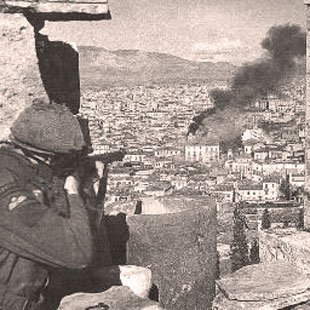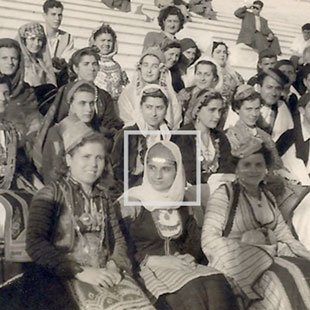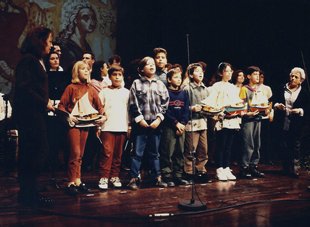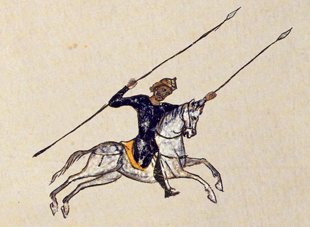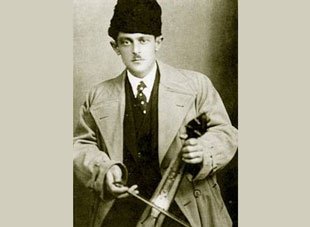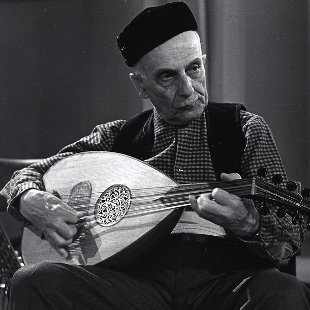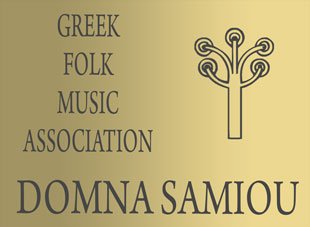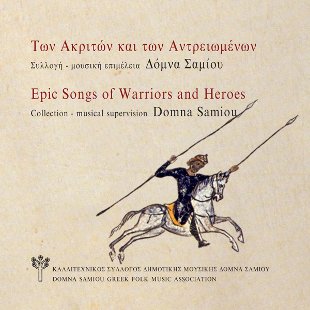You are at: Home page Her Work List of Songs Charon Wore Black
The Death of Digenis
Ο Χάρος μαύρα φόρησεν
Listen
Lyrics
Charon wore black and rode his black horse,
he donned his scary black garments and set out for the feast.
At the edge of the feast, he found people celebrating,
in amidst the feast, he found people eating and drinking.
- Charon, you are welcome here. Won't you sit and eat and drink with us,
feast on tender rabbit and roast partridge,
and drink the sweet wine famous people drink,
the wine sick people drink and find themselves healthy again.
- I am Charon and I did not come here to eat or drink with you,
to eat tender rabbit and roast partridge,
to drink the sweet wine famous people drink.
No, I, Charon, came here to take the best among you.
- And who is the best among us, the one you've come to take?
- That thick-fingered bloke with the gaps between his teeth1.
When Digenis heard that, he grew very angry.
- Charon, is it me you mean, could it be me you're talking about?
Then, hand in hand, they entered the ring2
and fought for three nights and three days.
Wherever Charon gripped, blood spurted out,
wherever Digenis gripped, bones were crushed.
Just as Charon felt he was about to be defeated,
he turned to Digenis and said:
- Loosen your hold, Digenis, so we can start afresh.
And Digenis loosened his hold so they could start afresh.
Charon turned into a golden eagle and soared into the sky,
he opened his wings and he praised God.
- Praise be to You, Father who are in Heaven,
nothing will be done that is not Your will.
[You've made him so brave, how shall I ever bring him to you?
- Here, Charon; take this magical object3,
show it to Digenis and he'll follow you.
So Charon took the magical object,
showed it to Digenis, and Digenis fell ill in bed.
Three hundred men were standing outside his bedchamber,
wanting to go in and see him, but they remained hesitant.
And one short youth, whose britches hung low,
paused, rolled up his sleeves, went inside and asked:
- There are three hundred people standing outside,
wanting to come in and see you, but they're still hesitant.
- Tell them to come in and see me, tell them not to be afraid.
He ordered a silver table set, passed the men glasses and offered wine.
- Eat and drink, my lords, and I'll tell you my story.
- Tell us, Digenis, tell us of your bravery;
tell us of your youthful recklessness and your daring deeds.
- At the time of my youthful recklessness and my brave deeds,
the thorns were a palm’s-length long and the brambles knee-high.
Down by the riverbank, at the reed bed,
that's where I roamed night and day.
My beloved would ride behind me on my black steed
and her beauty brightened my way through the night.
And just as the day was sweetly breaking,
my eyes discerned a huge serpent,
its body forming sixty coils and two and seventy arches,
then circling twice more to devour me the hero Hellene4.
By the power and the grace of God,
I aimed my arrow at the serpent's centre arch.
My brave steed was thirsty from the snake's venom,
and I took him to the river Euphrates to drink.
There I found the Saracen surveying the broad river,
sitting there like a mountain, like a mountain even in sleep.
A dog was chasing a rabbit up the Saracen's back,
partridges chirped upon his head, and his nostrils were stalls for colts.
Digenis saw him and halted in his tracks, pondering how best to pay his respects.
All right, let's pay him his due respects.
- Hail, Saracen, guardian of the realm.
I need water, my steed would slake his thirst.
Digenis asked for water, but the Saracen drew his sword.
Digenis grabbed his staff, struck him once, then struck him hard again.
His foe was hurt, with eight broken bones, sixty-two broken ribs
and two other bones broken - those were his injuries.
They heart the staff strike sixty leagues away,
the lords finishing up their dinner in the King's quarters
heard the blow and leapt for cover.
- It must a thunder storm, it must be hailing hard,
or perhaps our Creator would destroy the world.
Just then, Paliopappous came along.
- Eat and drink, my lords and be ye not afraid.
'Twas the sound of Digenis' staff. Woe to him that takes the blow!
For he who suffered it and survived is still more braver than Digenis.
Then along came the Saracen, moaning as he drew near,
and the palace shook from his groans.
And one short youth, whose britches hung low,
paused, rolled up his sleeves and went inside and asked:
- Saracen, tell us - what happened to you?
- I guarded the blasted Euphrates for forty years;
neither bird nor human dared to pass me.
Then someone asked for water and I drew my sword.
So swift was he, he grabbed his staff
and struck me once, then struck me hard again,
he broke two of my bones and full eighteen ribs,
then two more bones again. And that is what ails me.
Lift my shoulder blade and you'll see my wound.
They lifted his shoulder blade to see his wound,
and as they lifted it his flank came into view;
the pain was unbearable and he died.
Then Digenis turned to his beloved one and said:
- Come here, my darling, 'tis time to bid farewell.
Don't marry Giannis - wed Kostantinos.
- Giannis was my husband and I'll marry him again.
- Come here, my darling. Let's bid each other farewell.
Marry Giannis or Kostantinos, whomever you want.
His beloved one went to bid him farewell.
And he embraced her so tightly that they both died.
Glory be to you, our good Lord high in the heavens;
you know everything, secret or not.
The living follow the dead, who left first.
May all those who hear us have a good and long life.
And, if they liked our song, they should offer us food and wine5.]
Translated by Michael Eleftheriou
1According to a superstition, people with gaps between their teeth die young.
2To this day, wrestling pairs in popular wrestling contests enter the arena hand in hand.
3God gives Charon some magical object, which will allow him to defeat Digenis and take him along. N.G. Politis imagines something like a gorgoneion.
4A loanword from the Pontic dialect in which ‘Hellene’ means a brave young man, a hero with formidable strength (see An eagle soared). But ‘Hellene’ also features in the Cypriots’ native dialect, where it refers to a mythic giant.
5The last five lines, which have no bearing on the rest of the song, are a typical ‘ending’ which Cypriot bards/poets would add to the end of long narrative songs in the hope that their philosophical musings, coupled with blessings and flattery directed at their audience, would ensure that they were well paid.
Original Lyrics
Ο Χάρος μαύρα φόρησεν
O θάνατος του Διγενή
Ο Χάρος μαύρα φόρησεν, μαύρον καβαλικεύκει,
μαύρα σκλαβούνικα1 φορεί να πα στο παναΰριν.
Στην νάκραν του παναϋρκού ήβρεν τους χαροκόπους2,
στη μέσην του παναϋρκού ήβρεν τους τρων και πίνουν.
Καλώς ήρτεν ο Χάροντας να φά', να πκιει μιτά μας3,
να φάει άγριν4 του λαού, να φα' οφτόν περτίκιν5,
να πιει γλυκόποτον κρασίν που πίνουν φουμισμένοι6,
που πίνουσιν οι άρρωστοι και βρέθουνται γιαμένοι7.
- Εν ήρτα 'γιώ ο Χάροντας να φάω, να πκιω μιτά σας,
να φάω άγριν του λαού, να φάω οφτόν περτίκιν
μηέ γλυκόποτον κρασίν που πίνουν φουμισμένοι,
μόνον ήρτα ο Χάροντας τον κάλλιο σας να πάρω.
- Και πκοιος ένι ο κάλλιος μας απού 'ρτες για να πάρεις;
- Κείνος ο χοντροδάκτυλος, κείνος ο ναρκοδόντας8.
Που τον γροικά ο Διενής αρκώθην9 κι εθυμώθην.
- Για μέν' το λέεις Χάροντα, για μέν' το συντυχάνεις10.
Χερκές, χερκές επκιάσασιν11 και στην παλιώστραν πάσιν
και κει 'νι που παλιώνασιν12 τρεις νύκτες, τρεις ημέρες.
Κει πο' 'πκιανεν ο Χάροντας τα γαίματα πιτούσαν,
κει πο' 'πκιανεν ο Διενής τα κόκκαλα ελειούσαν13.
Κει πο' νοσεν14 ο Χάροντας πως έν' να τον νικήσει,
επολοήθην κι είπεν του τού Διενή, και λέει.
- Και χάμνα χάμνα15, Διενή, για να μεταπκιαστούμεν16.
Κι εχάμνησεν ο Διενής για να μεταπκιαστούσιν.
Γρουσός ατός17 εγίνηκεν στους ουρανούς κι εξέην18
κι ανοίξεν τες αλάτες19 του και το Θεό δοξάζει.
- Δοξάζω σε, καλέ Θεέ, που 'σαι στα ψηλωμένα,
καμιά βουλή ε γένεται με δίχως σου εσένα.
[Αντρειωρκές που το 'δωσες20 και πώς να σου τον φέρω;
- Και πκιάσε, πκιάσε, Χάροντα, και τούτην τη θεότην21,
του Διενή την έπαρε κι έρκεται τ' απισώ σου.
Και πκιάνει, πκιάν' ο Χάροντας κι εκείνην τη θεότην,
του Διενή την έδειξεν και πέφτει στο κρεβάτιν.
Απεξωθκιόν22 του στέκονται τρακόσοι δκυο νομάτοι,
θέλουν να μπούσιν να τον δουν και 'κόμα 'κροφοούνται.
Κι έναν κοντόν, κοντούτσικον και χαμηλοβρακάτον
στέκεται, νεπουγκώνεται23 και μπαίνει κι αρωτά τον.
- Απεξωθκιό σου στέκουνται τρακόσοι δκυο νομάτοι,
θέλουν να μπούσιν να σε δουν και 'κόμα 'κροφοούνται.
- Πε τους να μπούσιν να με δουν, πε τους να μη φοούνται.
Στήνει τους τάβλαν αρκυρήν, ποτήριν και κερνά τους.
- Τρώτε και πίνετ', άρκοντες, κι εγιώ να σας ξηούμαι24.
- Και πε μας, πε μας, Διενή, πα στες παλικαρκές σου,
πάνω στες παιδκιωσύνες25 σου και τες αντρειωρκές26 σου.
- Πάνω στες παιδκιωσύνες μου και τες παλικαρκές μου
ήτουν τ' αγκάθιν πιθαμή και το τριόλιν27 δόλιν28.
Κάτω στες νάκρες των νακρών, στον αρκοκαλαμνιώναν29,
κει μέσα έν' που γύριζα και νύχταν και ημέραν,
είχα και την καλίτσα μου πίσω μου πα στο μαύρον
κι έφγγαν μου τα κάλλη της την νύχταν να γυρίζω.
Και πα στα γλυκοξίφωτα που πα να ξημερώσει,
σιαστήκασιν30 τ' αμμάδκια μου κι ένα μεγάλο φίιν·
εξήντα τζύκλους έκαμνεν, βδομηνταδκυό καμάρες,
κι ακόμα δκυο τζυκλίσματα τον Έλενον31 να φάει.
Με του Θεού τη δύναμην, με του Θεού τη χάρην,
μπαίνω και σαϊτεύκω τον στη μεσακήν καμάραν.
'Πού το φαρμάκιν του φιδιού εδίψασεν ο μαύρος
και στον Αφρίτην32 ποταμόν πάω να τον ποτίσω,
πά' κι ηύρα τον Σαρακηνόν κι έβλεπεν τον Αφρίτην.
Σαν το βουνόν εκάθετουν, σαν τ' όρος εκοιμάτουν,
και πάνω στη ραχούλα του σκύλος λαόν εβούραν33,
πάνω στην κεφαλούλαν του περτίκια κακαρίζαν
και μέσα στα ρουθούνια του αππάρκα34 ξισταβλίζαν35.
Και που τον είδε Διενής γοιον36 να τον κροφοήθην
και στέκει, δκιαλοΐζεται πώς να τον χαιρετήσει.
Άτε, ας τον χαιρετήσομεν γοιον37 πρέπει, γοιον ταιρκάζει.
- Και γεια σου, γεια Σαρακηνέ, γλεπάτουρε38 του τόπου,
νάκκον39 νερόν χερκάστηκα40 τον μαύρον να ποτίσω.
Τούτος νερόν εζήτησεν, κείνος σπαθίν ετάβραν41.
Ο Διενής ογλήορος άρπαξεν το ραβτίν του
και μια ξυλιάν του ξύλωσεν και μια ξυλιάν του βκάλεν,
τσακίζει τ' οχτώ κόκαλους κι εξηνταδκυό παΐες42,
κι άλλους δκυο μονοκόκαλους, κείνη 'ν' η αρρωστιά του.
Ξέην το νάχος43 της ραβκιάς εξηνταπέντε μίλια.
Άρκοντες εποτρώασιν μες στου ρηός τα σπίδκια
και την ξυλιάν ακούσασιν κι ούλοι μπρουμουτιστήκαν.
- Κάπου στράφτει, κάπου βροντά, κάπου χαλάζι ρίβκει,
γιά θέλησεν ο πλάστης μου τον κόσμον του να χάσει44!
Να σου και τον Παλιοπαππούν που κειαχαμαί και ράσσει45.
- Τρώτε και πίνετ' άρκοντες, τίποτες μη φοάστε,
κι ένι ξυλιά του Διενή, κι αλί τον που την έφαν,
και που την έφαν κι έζησεν, κάλλιον του παλικάρι46.
Να σου και τον Σαρακηνόν κι έρκετον κογκυστώντα47
και 'πού τες ποκογκύστρες του εσειούνταν τα παλάδκια.
Κι έναν κοντόν κοντούτσικον και χαμηλοβρακάτον
στέκεται, νεπουγκώνεται, και μπαίνει κι αρωτά τον.
- Και πε μας, πε, Σαρακηνέ, είντα 'ν' η αρρωστιά σου;
- Σαράντα χρόνους έβλεπα το γέρημον Αφρίτην,
μήτε πουλίν εδκιάλασεν48, μήτ' άνθρωπος επέρναν
κι ένας νερό μου ζήτησεν κι εγιώ σπαθίν ετάβρουν.
Κείνος απού 'τον γλήορος άρπαξεν το ραβτίν του
και μια ξυλιάν μου έδωσεν, και μια ξυλιάν μου βκάλεν,
τσακίζει μου δκυο κόκαλα και δεκοχτώ παΐες
κι άλλους δκυο μονοκόκαλους, τούτη 'ν' η αρρωστιά μου.
Σηκούτε την κουτάλα49 μου να δείτε τη ραβκιάν μου.
Σηκώσαν την κουτάλαν του να δούσιν τη ραβκιάν του,
σήκωσαν την κουτάλαν του κι εφάνην το φλαγκίν30 του
και 'πού τον πόνον τον πολύν εξέην η ψυχή του.
Και 'πολοάτ' ο Διενής της κάλης του και λέει.
- Έλα ώδε, καλίτσα μου, ν' αποχαιρετιστούμεν.
Το Γιάννη εσού μεν πάρεις, κι έπαρ' τον Κωσταντίνον.
- Ο Γιάννης άντρας μου ήτουν, πάλε τον Γιάννη παίρνω.
- Έλα ώδε, καλίτσα μου, ν' αποχαιρετιστούμεν,
θέλεις το Γιάννη έπαρε, θέλεις τον Κωσταντίνον.
Επήεν κι η καλίτσα του ν' αποχαιρετιστούσιν,
στ' αγκάλια του την έσφιξεν κι εξέην η ψυχή τους.
Δοξάζω σε, καλέ Θεέ, που 'σαι στα ψηλωμένα,
οπού γινώσκεις τα κρυφά και τα φανερωμένα,
'πό πίσω παν τα ζωντανά κι ομπρός τα πεθαμένα.
Ζωήν και χρόνους να 'χουσιν όσοι κι αν τ' αγροικούσιν,
κι αν έν' η γνώμη τους καλή, πρέπει να μας κερνούσιν51.]
1Το σκλαβούνικο είναι ένα είδος επενδύτη, συνήθως έτσι ονομάζεται στα κυπριακά το αμάνικο γιλέκο. Πιθανόν η λέξη να παραπέμπει στη φορεσιά των Σκλαβηνών ή Σκλάβων, όπως ονομάζονταν από τους Βυζαντινούς τα σλαβικά φύλα που εμφανίστηκαν στα όρια της αυτοκρατορίας τον 6ο αιώνα, περνώντας στο θρύλο σαν το απόλυτα άγνωστο, άγριο και απειλητικό - όπως άλλωστε και ο Χάρος.
2χαροκόπους: τους γλεντιστές
3μιτά μας: μαζί μας
4άγριν: τη λέξη συναντάμε και ως άφριν ή άκριν· είναι ο καλύτερος μεζές απ' το λαγό
5οφτόν περτίκιν: ψητό περδίκι
6φουμισμένοι: ξακουσμένοι
7βρέθουνται γιαμένοι: γιατρεύονται
8ναρκοδόντας: αραιοδόντης, κατά τη λαϊκή δεισιδαιμονία όποιοι έχουν αραιά δόντια πεθαίνουν νέοι
9αρκώθην: εξαγριώθηκε
10συντυχάνεις: κουβεντιάζεις
11χερκές, χερκές επκιάσασιν: Πιάστηκαν από τα χέρια. Μέχρι σήμερα στους λαϊκούς παλαιστικούς αγώνες οι αντίπαλοι προσέρχονται στην παλαίστρα κρατημένοι απ' το χέρι
12παλιώνασιν: παλεύανε
13ελειούσαν: έλιωναν
14κει πο’ νοσεν: μόλις κατάλαβε
15χάμνα: χαλάρωσε το σφίξιμο
16μεταπκιαστούμεν: να ξεκινήσουμε νέο γύρο πάλης
17γρουσός ατός: χρυσός αετός
18εξέην: ανέβηκε
19αλάτες: φτερούγες, ιταλ. ala = φτερό
20αντρειωρκές που το ’δωσες: τέτοια ανδρεία που του έδωσες
21Ο Θεός δίνει στο Χάροντα κάποιο θεϊκό εφόδιο για να μπορέσει να νικήσει τον Διγενή και να τον πάρει μαζί του. Ο Ν.Γ. Πολίτης υποθέτει κάτι σαν γοργόνειο. Στην ουσία ο Θεός χρησιμοποιεί μια μαγική πρακτική σαν εκείνες που ζητούν απ' τις μάγισσες οι ερωτευμένοι για να υποτάξουν το αντικείμενο του ερωτά τους.
22απεξωθκιόν: έξω απ' την κάμαρα του
23νεπουγκώνεται: ανασκουμπώνεται
24ξηούμαι: λέω, αφηγούμαι
25παιδκιωσύνες: νεανικές αποκοτιές
26αντρειωρκές: ανδραγαθήματα
27τριόλιν: τριβόλι, άγρια βάτα
28διόλιν: Από τα συμφραζόμενα και από άλλες παραλλαγές του τραγουδιού ο Πολίτης θεωρεί ότι σημαίνει «σε αφθονία». Η Μ. Κιτρομηλίδου (Ακριτικά τραγούδια και παραλογές από την Κύπρο, Λευκωσία 1990, σ. 102) αναφέρει ότι δόλιν είναι το γόνατο. Επομένως μάλλον η έκφραση σημαίνει «ψηλό μέχρι το γόνατο».
29στον αρκοκαλαμνιώναν: στον άγριο καλαμιώνα.
30σιαστήκασιν: διέκριναν
31Όπως σημειώνει ο Ν.Γ. Πολίτης (Λαογραφία 1 (1909) & αναδημοσ. Σύμμεικτα 4 (1980-1985), σ. 126), ο πρώτος εκδότης του τραγουδιού Σίμος Μενάρδος (στο Ακρίτας 1 (1904). σ. 207), από το απλό λ στην προφορά του ποιητάρη από τον οποίο κατέγραψε το τραγούδι, από το ε αντί του η, και την κατάληξη -ος συμπέρανε ότι η λέξη είναι επείσακτη από το ποντιακό ιδίωμα, όπου Έλληνας σημαίνει παλικάρι, ήρωας με τεράστια δύναμη (βλ. τραγούδι Αϊτέντς επαραπέτανεν). Πάντως και οι Κύπριοι ονομάζουν Έλληνα έναν φανταστικό γίγαντα.
32στον Αφρίτην: στον Ευφράτη
33σκύλος λαόν εβούραν: σκύλος κυνηγούσε λαγό
34αππάρκα: αλογάκια
35ξισταβλίζαν: σταβλίζονταν
36γοιον: σαν
37γοιον: καθώς
38γλεπάτουρε: βιγλάτορα, φύλακα
39νάκκον: λιγάκι
40χερκάστηκα: χρειάστηκα, ζήτησα
41ετάβραν: τράβηξε
42παΐες: πλευρά
43ξέην το νάχος: ακούστηκε ο ήχος
44να χάσει: να χαλάσει, να καταστρέψει
45που κειαχαμαί και ράσσει: που από εκεί περνάει
46Αλίμονο σε κείνον που έφαγε τέτοιο χτύπημα, κι όποιος το έφαγε και επιβίωσε είναι πιο ανδρείος από τον Διγενή.
47κογκυστώντα: γογγύζοντας
48εδκιάλασεν: διάβαινε
49κουτάλα: ωμοπλάτη
50φλαγκίν: Συνήθως σημαίνει το συκώτι. Ίσως όμως εδώ να σημαίνει τα πλευρά από το γαλλικό flanc.
51Οι πέντε τελευταίοι ομοιοκατάληκτοι στίχοι, άσχετοι με το περιεχόμενο του τραγουδιού, αποτελούν ένα στερεότυπο «κλείσιμο» που οι Κύπριοι ποιητάρηδες προσαρτούσαν στα μακροσκελή αφηγηματικά τραγούδια, όπου με φιλοσοφικούς στοχασμούς καθώς και ευχές και κολακείες προς το ακροατήριο απέβλεπαν στην εξασφάλιση της αμοιβής τους.
Information
- Region: Cyprus
- Categories: Acritic Song
- Duration: 03:37
Collaborators
- Singer: Christos Sikkis
Albums
Notes
Songs on the death of Brave men
Of all the songs in the Digenis cycle, the best and most widely known - including the very few that researchers now recognize as properly ‘akritic’ - are those that relate to the death of the never-defeated hero. Βλ. τραγούδια Kostantis and Kostantas, Charon and the brave men, Last night I crossed rivers. Akritas goes hunting', Charon wore black, Digenis is dying.
In the popular imagination, it is unthinkable that such a hero should be subject to the common fate of common folk and be allowed to die. And, truth be told, there was little that was philosophical or meditative about the heroic mindset. A slave to his impulses and his strength, the hero will once again square up against an opponent and challenge him, even if he is Death himself. And the hero will throw himself into battle once again, the latest in an endless string of feats; this time, though, he will be defeated.
As a theme, Digenis’ death belongs to the older, rich oral narrative tradition which centred on the personality, life and achievements of the akritic heroes so beloved by the populace. However, the fact that the struggle with Charon is absent from all the variants of the written epic led a number of researchers to conclude that this theme is also absent from the popular imagination during the akritic era. It was also used to argue that the written epic pre-dated the songs.
The oldest and richest song-type, the one Nikolaos Politis considered a recap of Digenis Akritas’ feats and the type closest to the written epic, is represented in this collection by a Cypriot variation (see Charon wore black).
Some of the other songs included here are loosely linked to the traditions relating to the death of Digenis or with the epic cycle more generally (e.g. Kostantis and Kostantas). They include however names, verses and concepts linked to the Akritic cycle and besides the central theme of death, they also refer to other aspects of the hero’s everyday life, work, family and loves. Miranda Terzopoulou (2017)
This song was first published in 1904 by Simos Menardos, as it was dictated to him by the bard Giannis Avramis from Komis, in Ακρίτας 1 (1904), pp. 297-300. N.G. Politis republished it with a commentary in his study ‘The death of Digenis’, Λαογραφία 1 (1909) which was reprinted in Σύμμεικτα 4 (1980-1985), pp. 122-126.
Recording information
Studio recording, 2004.
